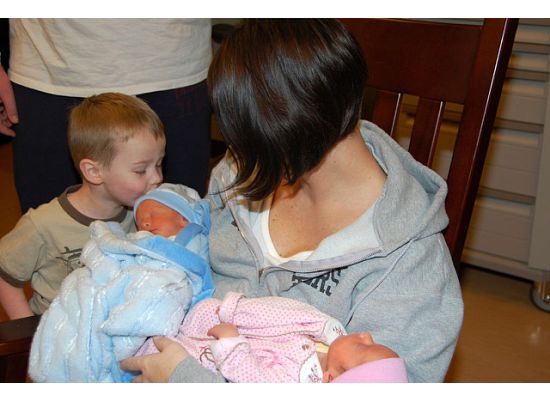This week I chose to look more closely at the practice of breastfeeding. This topic is very personal to each expectant mother. In some countries there is a pressure to breastfeed, while in others it is very rare to breastfeed.
Breastfeeding provides many benefits to the mother and baby. These benefits include: bonding, cost savings, healthy benefits, and reduction of many illnesses for the mother and child.
The cells, hormones, and antibodies in breast milk protect babies from illness. Breastfeeding may reduce the babies risk of:
Necrotizing entercolitis (a disease that affects the gastrointestinal tract in preterm infants)
Lower Respiratory infections
Asthma
Type 1 and Type 2 Diabetes
Obesity
Childhood Leukemia
Lower risk of SIDS
Lower risk of water contamination
Since I have Type 1 Diabetes, I chose to breastfeed my children. Since they are at higher risk of having diabetes because of me, I wanted to try to reduce this risk in any way possible. I nursed Noah for 11 months while teaching full-time. I only quit when he became too nosy. I also nursed Owen and Ella. They were both preterm and were born during RSV season. I wanted to provide them with as many antibodies as possible to help reduce infections. I nursed Ella until she was 10.5 months and became a biter. I nursed Owen until he was 16 months old. He would probably still nurse if I let him. He loved it! Since Owen has many health issues, I believe that this provided him with the best start possible. Please visit his Caringbridge site at www.caringbridge.org/visit/owenred to see his page. Prayers are welcomed and appreciated. :)
Breastfeeding around the world is different.
In Africa, many women breastfeed. It is open to the public eye and they use a feed on-demand style with the baby.
In the United Kingdom, many women go back to work quickly. It is not practiced in public.
In Ireland, very few women breastfeed. It is not encouraged or talked about openly.
In France, about 50% of mothers breastfeed. Many mothers are working moms and nursing is done in private.
Resources:
www.womenshealth.gov/breastfeeding
http://www.breastfeed.com/nursing-mothers-life/nursing-facts

I select the same topic... How many months or years you breastfeed your children?
ReplyDeleteThanks for an interesting blog post Sarah! I also choose the topic of breastfeeding this week and we unearthed some of the same information. I especially like the way you have woven in your personal experience with breastfeeding your own children.
ReplyDeleteI am also grateful for the short blurbs you did with a few facts about the practices of breastfeeding in different countries. It is amazing how very different each country views breastfeeding. In Serbia new mothers get one entire year of paid leave after giving birth! Even so, less that 15% of Serbian mothers breastfeed.
Sarah.
ReplyDeleteI think back to when I had my son 18 years ago, and how I was nervous about the whole breastfeeding experience.OUCH! But I breast fed for a short period of time due to his size and my ability to keep up with his needs. WHen I had my daughter my mother in law was really uncomfortable with the whole breast feeding thing, and would freak if I would breastfeed in public. I would remind her about the importance behind nutrition, bonding, and vitamins, and of course brain development. Again thanks for sharing.
Thank you so much for sharing your personal experiences with your babies! I find stories like yours very encouraging because so many mothers want to but may not be able to breastfeed for many reasons. I had certain challenges too, but I am grateful to have been able to breastfeed at least for a little while. BTW, Owen is in my prayers!
ReplyDeleteNoemi- Sorry! I just noticed this post! I nursed Noah for 11 months, Ella for 10.5 months, and Owen for 16 months.
ReplyDelete